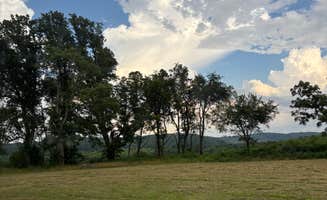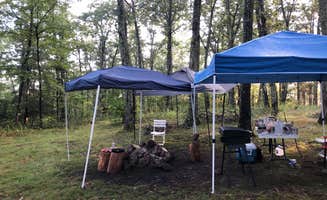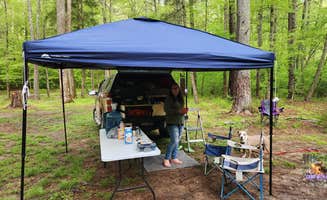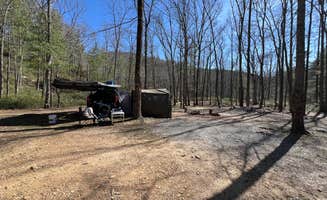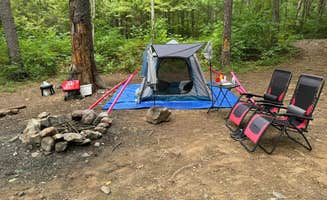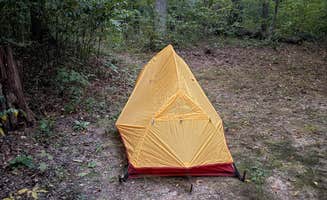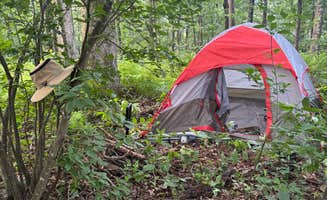Primitive camping near Covesville, Virginia centers around several Wildlife Management Areas and National Forest sites within 15-45 miles of town. The elevation varies from 700 feet at James River WMA to over 3,800 feet at Spy Rock, creating different seasonal camping experiences. Winter temperatures average 25-40°F with summer highs of 80-90°F, while spring and fall offer moderate conditions with occasional heavy rainfall affecting access roads.
What to do
Trail exploration: Mount Pleasant National Scenic Area offers several hiking options near Reservoir Road Dispersed Campsite. "Multiple spots along reservoir rd" provide access points to trails with varying difficulty levels. The area features mountain terrain with elevation changes of 500-1000 feet.
Fishing: James River Wildlife Management Area provides boat access and bank fishing opportunities with stocked trout. "I never saw another person camping, but I did get out of my rig and ask a couple of people that were using brush hogs to mow with and they said Yep come on down here and just park wherever you want to as long as it's not within 300 feet of the boat put in," notes one visitor about the fishing regulations.
Rock scrambling: Spy Rock requires a challenging 1.5-mile uphill hike leading to a rock formation with scrambling opportunities. "The hike up is brutal but the top is absolutely worth it," shares one camper. The summit involves a moderate rock scramble suitable for reasonably fit hikers with proper footwear.
Wildlife observation: Laurel Prong Trail offers chances to spot native wildlife including black bears. "Bears were constantly checking out our tent during night," reports one camper, highlighting the importance of proper food storage. The area requires a Shenandoah National Park permit for overnight stays.
What campers like
Solitude: James River WMA Dispersed Camping provides isolation from crowds even on weekends. "This is where we stay any time I need to work in-office down in Lynchburg, VA. It is 20 minutes from the closest grocery store (Food Lion), liquor store, gas station, and propane supplier (Foster Fuels)," notes one regular visitor who appreciates the balance of seclusion with nearby services.
Water features: George Washington National Forest off 812 offers several creekside camping spots. "We had the absolute best time. It was so peaceful being by the creek and just relaxing. You are off the road of the national forest so cars come by but nobody bothers you and it stays quiet," shares one camper. Most sites feature small flowing streams suitable for filtering drinking water.
Star viewing: Braley Pond Dispersed Camping provides minimal light pollution for astronomical observation. "The stars were amazing! There was plenty of wood scattered about to use as firewood," notes one reviewer who had the entire area to themselves on a Saturday night. Clear nights offer visibility of the Milky Way and numerous constellations.
Flat terrain: Dispersed Camping Site off FR 812 features several level areas suitable for multiple tents. "It is a very rocky path, about 50 feet long, to get into the campground, but then it is smooth and well laid out. There is a giant fire circle in the middle and enough room to fit about 10 vehicles/groups if people don't mind being next to each other," explains one visitor.
What you should know
Permit requirements: James River Wildlife Management Area requires a specific permit purchased online. "You simply need to purchase either a daily or annual access pass from the DWR website and then report which days you will be staying at the WMA--it's currently $23 for the annual pass," advises a regular visitor.
Road conditions: Reservoir Road Dispersed Campsite requires navigating challenging unpaved roads. "This was about 5 miles of dirt road to get to it," warns one camper who questioned whether their van could handle the terrain. Most access roads become particularly difficult after rain events.
Cell service: Coverage varies significantly by provider and location. "I had great T-Mobile service, but no ATT service--even with a powerful LTE antenna," reports a camper at James River WMA. At George Washington National Forest, "You loose cell service a couple miles from the site."
Campsite availability: Most dispersed sites operate on first-come, first-served basis with no reservation system. "Multiple road sites that fit my van with room to spare - 80% were full on a beautiful fall Friday evening around 6pm but still snagged one," notes a visitor to Forest Road 812, highlighting the importance of weekday visits or early arrival on weekends.
Tips for camping with families
Fire preparation: Braley Pond Dispersed Camping includes established fire rings at most sites. "There are fire rings, firewood, and enough room to pull in, pitch a large tent, (ours was a 10-person) and hang hammocks," shares a family camper. Bring a hatchet or saw as most available wood requires processing.
Water activities: Stream access provides natural entertainment for children. "Though you can't swim in the lake, we did wade the stream, which was cold and clear and beautiful," notes a parent who visited with their children. Most creeks maintain depths of 6-12 inches with gentle currents.
Safety considerations: Spy Rock requires careful supervision of children near cliffs. "The views from atop Spy Rock are some of the best in Virginia, and the campsite is one of my favorites. You hike in and there is a decent sized area to set up tents," shares a visitor who recommends the spectacular views but cautions about the exposed summit areas.
Tips from RVers
Length restrictions: Most dispersed sites accommodate smaller rigs under 25 feet. At James River WMA, one RVer notes, "for me being in the 29 foot classy. I opted to park it in a field/parking area at the entrance. I was the only one here all day."
Leveling challenges: Many sites require significant leveling equipment. Bring extra leveling blocks and chocks as terrain can feature slopes of 5-15 degrees.
Turnaround space: Limited turning radius at many forest road sites. Most forest road pullouts require backing in or out with limited space for larger vehicles to maneuver. Scouting ahead on foot before driving in is recommended for rigs over 20 feet.


